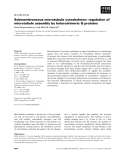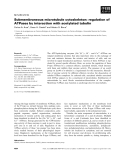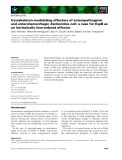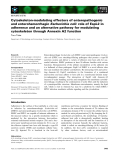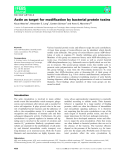
Cytoskeleton effectors
-
Heterotrimeric G proteins participate in signal transduction by transferring signals from cell surface receptors to intracellular effector molecules. G proteins also interact with microtubules and participate in microtubule-dependent centrosome⁄chromosome movement during cell division, as well as neuronal differentiation.
 10p
10p  inspiron33
inspiron33
 23-03-2013
23-03-2013
 36
36
 5
5
 Download
Download
-
The ATP-hydrolysing enzymes (Na + ,K + )-, H + - and Ca 2+ -ATPase are integral membrane proteins that play important roles in the exchange of ions and nutrients between the exterior and interior of cells, and are involved in signal transduction pathways. Activity of these ATPases is reg-ulated by several specific effectors.
 11p
11p  inspiron33
inspiron33
 23-03-2013
23-03-2013
 41
41
 4
4
 Download
Download
-
Enterohemorrhagic and enteropathogenicEscherichia coliproduce various effector proteins that are directly injected into the host-cell cytosol through the type III secretion system. E. colisecreted protein (Esp)B is one such effector protein, and affects host-cell morphology by reorganizing actin net-works.
 7p
7p  mobifone23
mobifone23
 21-01-2013
21-01-2013
 37
37
 3
3
 Download
Download
-
EnterohemorrhagicEscherichia coli(EHEC) and enteropathogenic Escheri-chia coli (EPEC) are attaching⁄effacing pathogens that possess a type III secretion system and deliver a variety of effectors into host cells for suc-cessful infection. EHEC produces at least 20 effector families with various functions.
 6p
6p  mobifone23
mobifone23
 21-01-2013
21-01-2013
 32
32
 5
5
 Download
Download
-
A variety of microbes manipulate the cytoskeleton of mammalian cells to promote their internalization, motility and⁄or spread. Among such bacte-ria, enteropathogenic Escherichia coliand enterohemorrhagic Escherichia coliare closely related pathogens that adhere to human intestinal cells and reorganize the underlying actin cytoskeleton into ‘pedestals’.
 13p
13p  mobifone23
mobifone23
 21-01-2013
21-01-2013
 41
41
 5
5
 Download
Download
-
Various bacterial protein toxins and effectors target the actin cytoskeleton. At least three groups of toxins⁄effectors can be identified, which directly modify actin molecules. One group of toxins⁄effectors causes ADP-ribosy-lation of actin at arginine-177, thereby inhibiting actin polymerization.
 18p
18p  cosis54
cosis54
 04-01-2013
04-01-2013
 44
44
 3
3
 Download
Download
CHỦ ĐỀ BẠN MUỐN TÌM









